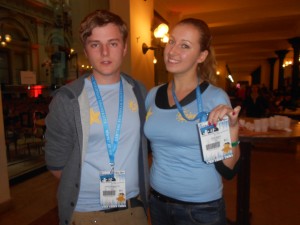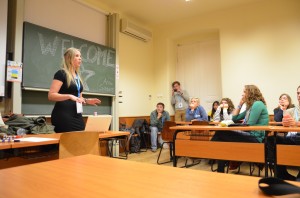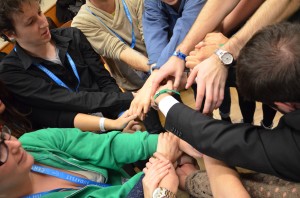On the 31st of October 2012, people from all over Europe assembled in Budapest to attend the Autumn Agora 2012. Of course the Eastern Partnership Project (EaP) was also present there! With a total of six people, we represented our team and increased the visibility of EaP among AEGEE members. Highlights were the AEGEE fair where we held a special EaP quiz, and a workshop with an inspiring title “Democracy on the Move!” Keep on reading to see how we brought EaP to Agora Budapest.
AEGEE fair & quiz
During the AEGEE fair, which is a traditional part of the Agora, all AEGEE bodies working on the European level have the chance to present themselves to all Agora participants. So we dressed up in our brand new EaP t-shirts, handed out flyers, and answered a lot (seriously, a lot!) of questions. We had some very interesting discussions with people and several antennae expressed their interest in cooperating with us.

On Friday afternoon, Anne Stikkers gave a workshop on democratization in EaP countries. Even though it was Friday afternoon and people were very tired, there was a great turnout of 32 participants. Most of the participants were from western Europe and mentioned that the main reason they joined the workshop was to learn more about EaP countries and democracy. Therefore, the workshop started with some general information about our project. After that, we talked, but that was not all – we had also prepared a special EaP quiz, with one question about every EaP country.
From the results of this quiz during “Democracy on the Move!” and people’s remarks (“This is so difficult!”) it was clear that most people do not know a lot about the EaP countries, so we obviously still have some work to do! However, our winner (Alex from AEGEE-Odessa) had made only one mistake and at the plenary meeting on the following day we called him up on stage to reward him with a present for this great result. There are two reasons why democratization processes in EaP countries are important. To begin with, in order to become a EU member a country needs to have a stable democratic political system. Secondly, Anne explained the theory of political philosopher Immanuel Kant, which comes down to the belief that democratic societies will not enter into violent conflict with each other. This is one of the leading theories about democracy in political science and international relations and it explains to a large extent why Europe wants its neighbors to be democratic.

The second half of the workshop was more interactive. We talked about which assets a democratic system typically has. We had a brainstorming session of about ten minutes and in the end, the whole blackboard was full of characteristics of democracies. We narrowed this down to four topics and divided the participants into four smaller groups. Then, they had to discuss how a particular asset of democratic systems could be achieved in society. In the concluding part of the workshop, where every group presented its results, it all came together, and we saw that actually, everything is interrelated. For example: if you want to achieve a good human rights record, you need active citizens to stand up for their rights. But for citizens to be active, it is necessary (or at least very convenient) to have freedom of speech and freedom of assembly. Other things that were mentioned several times were education and no corruption.

The workshop was a great success and it taught the participants not only about the current political situation in EaP countries, but it also showed them why it is so hard to establish a stable democracy in a country that has no democratic tradition. This is not to say that we should not work on it any more though. On the contrary: let us raise our voices, get active and build these democracies together! And, let us not forget the wise words once said by the 32nd president of the United States, Franklin D. Roosevelt: ”Democracy cannot succeed unless those who express their choice are prepared to choose wisely. The real safeguard of democracy, therefore, is education”.
Written by Anne Stikkers, the Content Manager of EaP Project & member of AEGEE-Groningen




